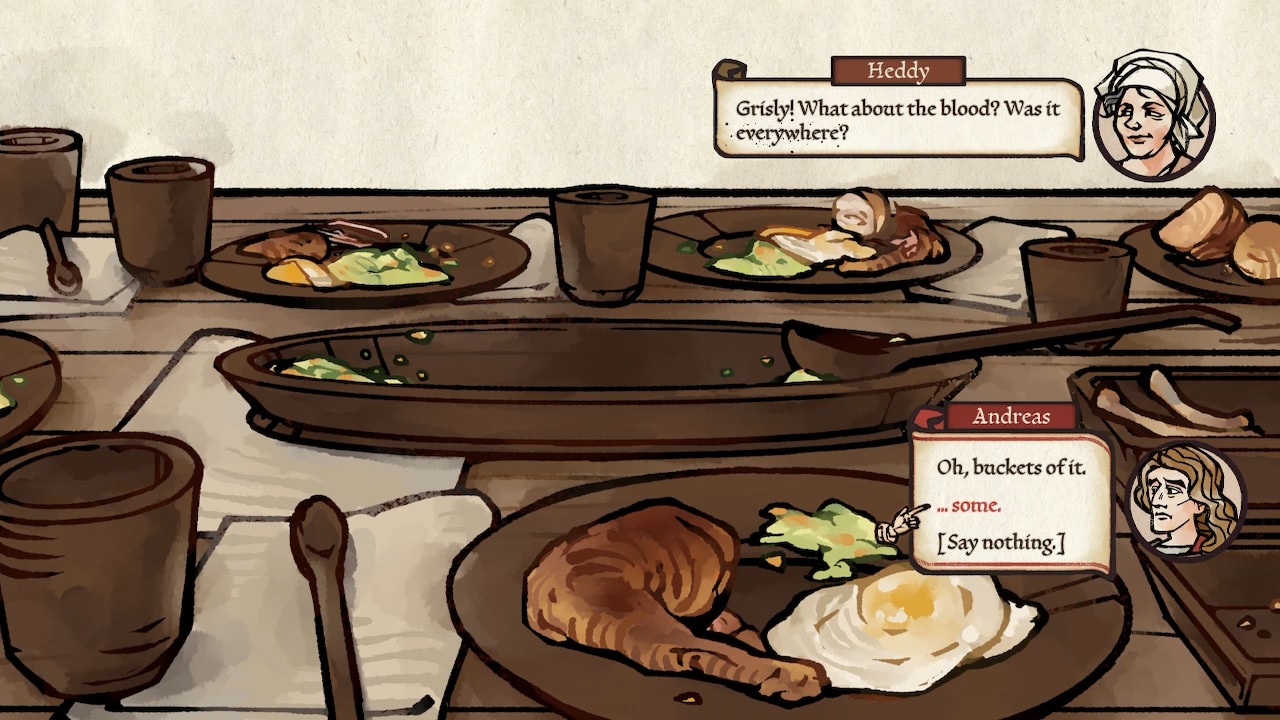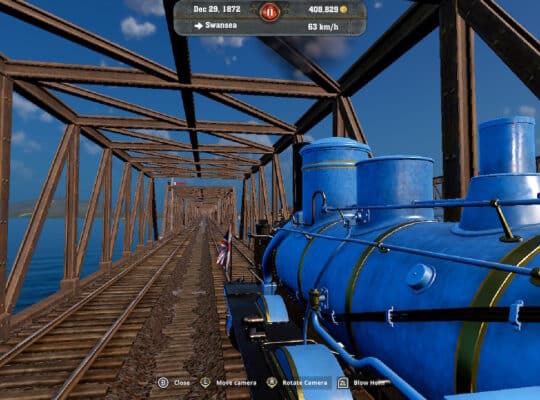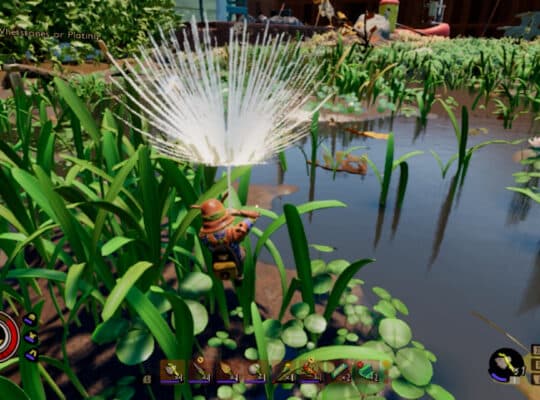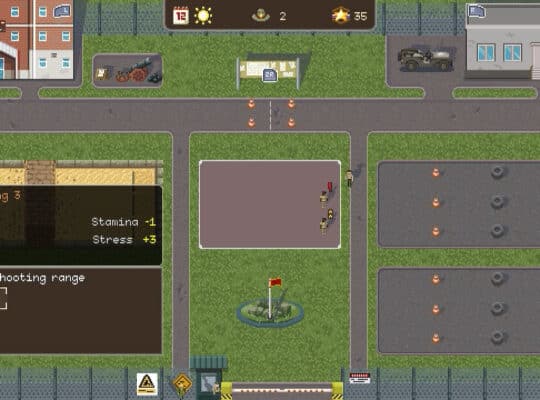Pentiment Switch Review
When Microsoft announced some of its games were going multi-platform, social media was abuzz with rumours that we would be joined by the likes of Sea of Thieves and Hi-Fi Rush, whipping gamers into a frenzy. When the reveal finally came to be, it was settled that Switch owners would receive Grounded and Pentiment, dampening a lot of hype and excitement. Now that Pentiment is here, I’m glad it came to Switch despite having almost zero excitement to play it. What’s It Like? Sharpen your quill, get your reading glasses, and open your parchment as we review Pentiment for Nintendo Switch.

Due to the nature of the game, this will be a relatively spoiler-free review, revealing only the story of Act 1.
Pentiment delicately weaves a tale of Andreas, an artist working in the scriptorium of an Abbey in a small Bavarian village called Tassing. Throughout the opening act, there is a murder, and Andreas is tasked to solve this murder in order to exonerate a monk and save him from death. Pentiment is set in the 1500s at a crucial time when the church is facing a time of change, and its strangling grip is slowly being loosened by the whispers of revolution. You must carefully navigate religious themes of faith and dedication to the church, whilst investigating the murder and dealing with people who have wavering faith in a time of corruption and greed. It also tells the story of impending change from both the church and townsfolk, with some desperately clinging to tradition, while others rebel against it. The world of Pentiment is one that can be influenced by your choices and actions, but not changed by them, and it does an excellent job with the narrative in doing so.
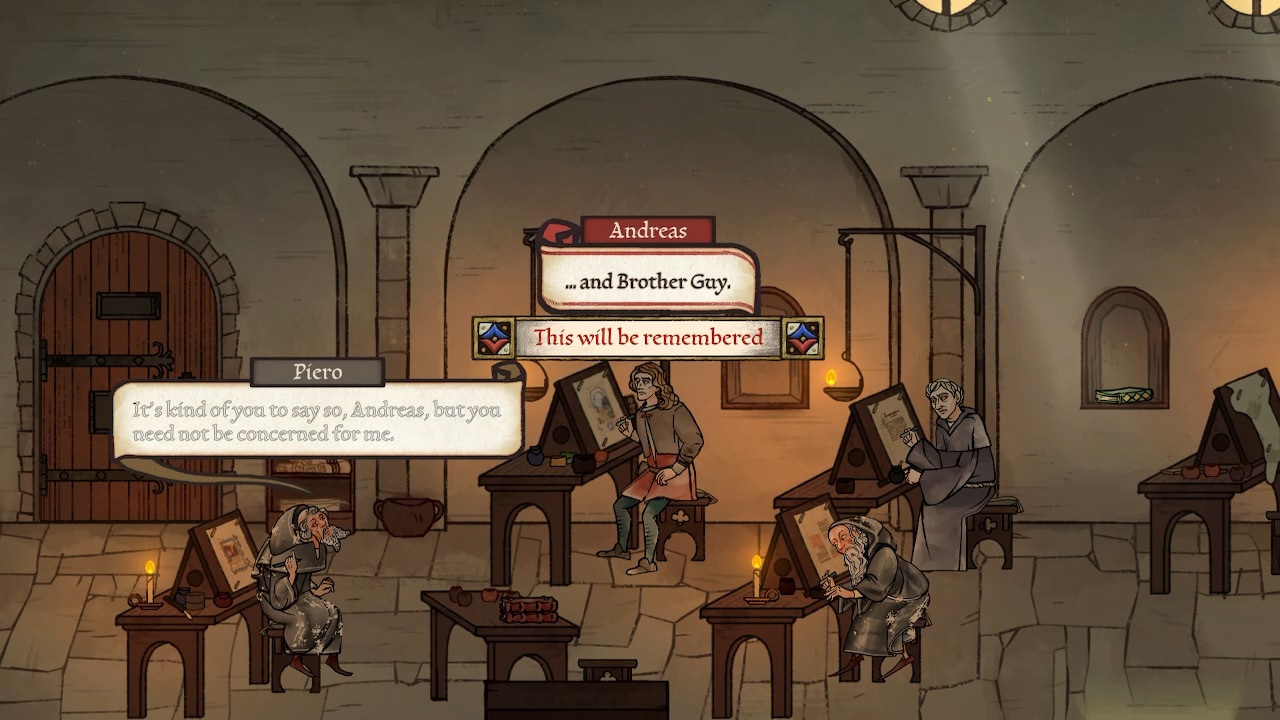
The gameplay works similar to a point-and-click adventure, as you walk around the world of Pentiment talking to people to help paint a picture of not only the murder but the world around you. You can select some details about your education and interest that help shape your playthrough, like studying medicine or the occult which opens up new options to problem-solving and dialogue. There is no spoken dialogue in the game, instead, it is full of very clever and well-thought-out mechanics, such as characters’ fonts reflecting their level of education, sometimes even changing when further information is revealed, correcting Andreas’ assumptions of them. The game plays as if it is being written in real-time, often with spelling mistakes that are corrected on the fly. You will make choices that will impact how characters react or help you. Do you stick to your convictions? Or pander to them in order to get information. You will make plenty of mistakes, and if you will it, some very poor choices that will impact those around you. There are some mini-games and puzzle-solving aspects of the game as well.
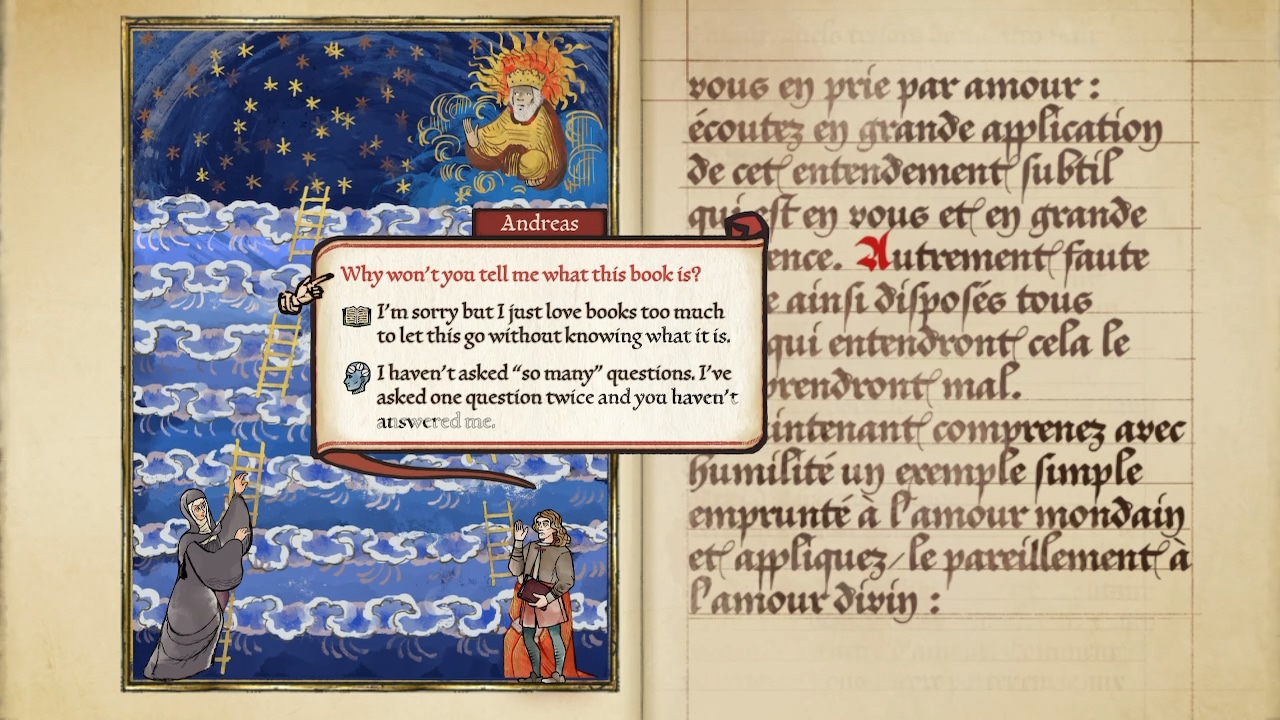
The nature of the game follows a daily routine that moves forward with actions you take. You won’t be able to follow all the leads in your investigation, forcing you to use your intuition to chase those you feel are the most important. It’s not frustrating in the slightest though, and I encourage you, the player, to not be afraid to make mistakes. There were times I wanted to reload my save, only to fight the urge to play it out and save that knowledge for my next play-through. The game’s expertly written characters play at your emotions, sometimes manipulating you to cloud your judgment at times, but also feel guilty for their situations. At the conclusion of Act 1, I took the time to step away wondering if I had done the right thing in condemning a man to death. Pentiments choices don’t boil down to a simplistic right or wrong, and the lack of clarity adds emotional weight to all of your actions as you sometimes will never know if you’ve made the right one.
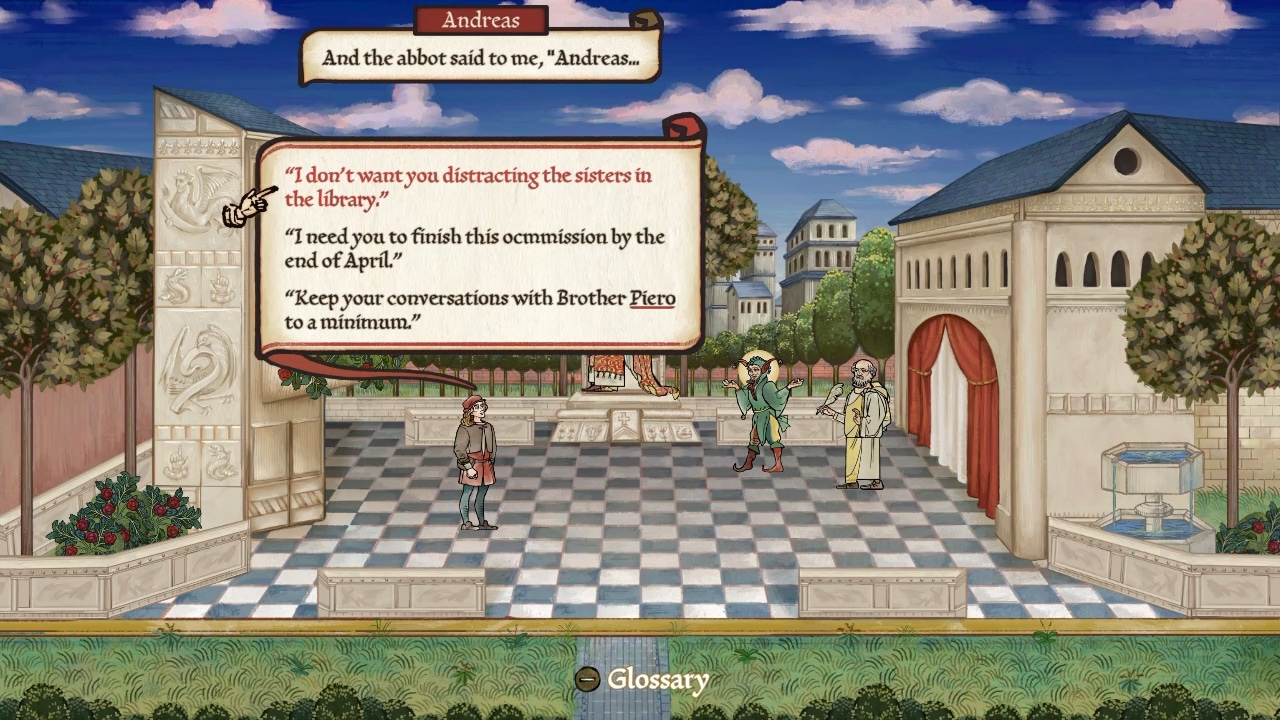
Graphically, the game honors the period’s art style with beautifully painted scenes and wonderful scripts. There are times when it may look almost too simple, but when you are immersed in the story, it does a wonderful job of using its art style to its advantage. Characters are beautifully drawn and change expression alongside the written word which is sometimes scrawled or bolded to convey emotions. There are also small touches you don’t even think of like when dining with people, the size of the meals afforded to you shed light on the family situation. The world of Pentiment is full of these minor details that are easily missed the first time around, and as a bonus, you can pet most of the animals you come across. For my vision-impaired artists, there are plenty of accessibility options to help you enjoy the world of Pentiment. You can select easy-to-read fonts instead of the various scripts, increase the text size, increase the heads of characters during dialogue modes, switch to high contrast mode, and select photosensitivity modes for a better experience. I was blown away by the accessibility options because despite being published by Obsidian Entertainment, Pentiment was a rather small passion project led by Fallout New Vegas’s Josh Sawyer, whose meticulous research and passion shine through in this game. All of this is backed by stellar ambient sound design and a haunting score that further invests you in the game.
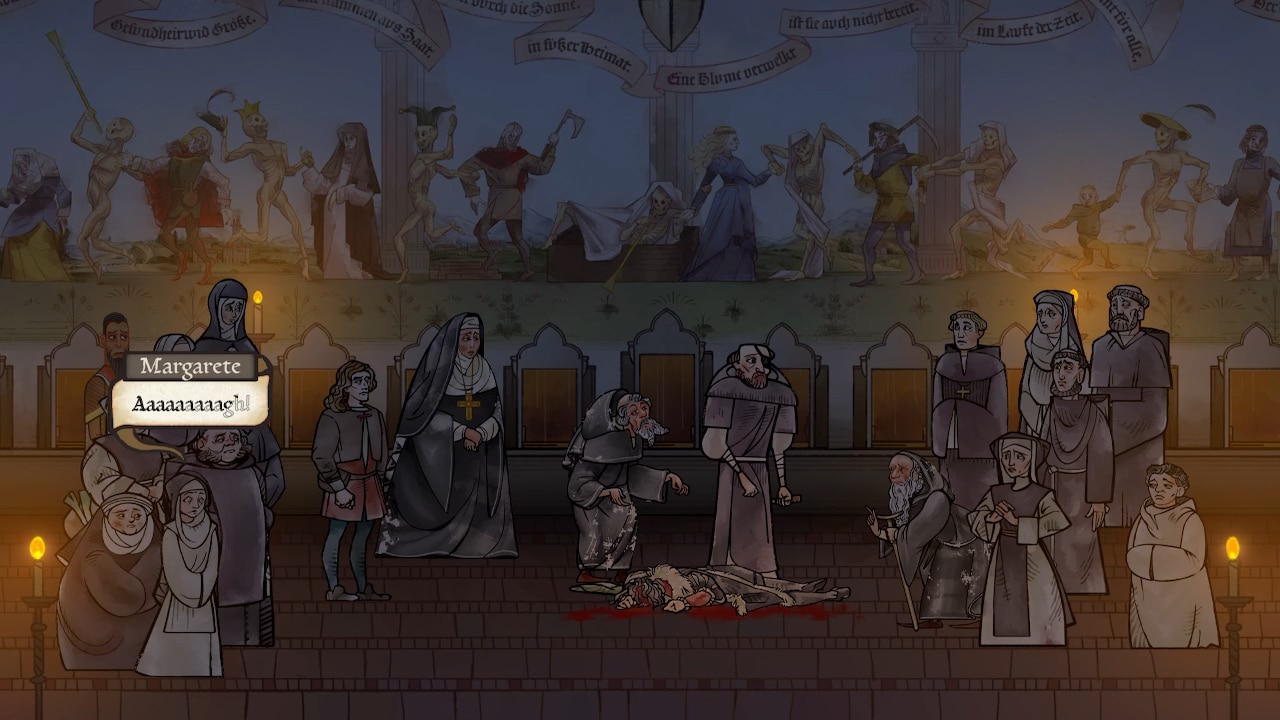
With all this high praise it also comes with the caveat that Pentiment might not be for you if you don’t enjoy text and story-heavy games. There are no action sequences of combat, and it is very similar to the sublime Disco Elysium, offering a deep narrative over action-heavy sequences. I don’t consider myself an intellectual so I know there were a lot of nuances about the period that were lost on me, yet I still cannot wait to play through again knowing what I know now to experience a different story for Andreas and the people of Tassling. My first playthrough took around 20 hours to complete, but that could be sped up with the instant text options, but you do miss out on some of the little details of the dialogue when that happens. For $30 AUD, $20 USD, and 15 Pounds in the UK, there’s a lot of gameplay with multiple playthroughs encouraged.

Pentiment isn’t for everyone. Those players who do dive in will find themselves swept away into a complex narrative that marches forward whether they make the right choices or not. It’s a gripping mystery with an expertly written ensemble of characters who welcome you into their homes and hearts. Pentiments choices will weigh on your mind long after the credits roll, and it’s that weight that will make you want to dive right back in to try to right the wrongs… if you can. Its gorgeous visuals and genre-breaking style coupled with its bevy of accessibility options mean the Pentiment is an experience that can be enjoyed by everyone looking for something with a bit of substance. Josh Sawyer and his team have created a work of art, and as art is subjective, it may not be appreciated by all and that’s ok. Pentiment may not be for all but it certainly deserves recognition for being the masterpiece in both story and design that it is.
So, What’s It Like? Pentiment is like a cross between Disco Elysium, and LA Noire.
